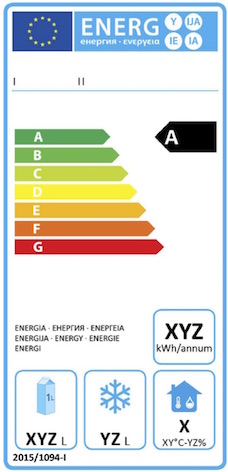Recommendations Professional Storage Refrigerators
Download full policy recommendations from May 2021 (pdf)
Summary

The market has evolved significantly since the entry into force of the regulation in 2016. While some product types have developed BATs faster than others, the overall changes are across all categories. Some models already reach the A+ class.
The Energy labelling and Ecodesign regulations for professional refrigerated storage cabinets were adopted in May 2015 and entered into force in July 2016. These two regulations were instrumental in transforming the market for professional refrigeration. Since then, the MEPS have been strengthened and classes G and F have been banned.
The revision of the regulation for professional refrigerated storage units is highly welcomed. Further topics should be considered during the review study to fill some existing gaps and maximise the impact of the regulation in the future:
Scope
- Refrigerated medicine cabinets, laboratory refrigerators and freezers and ice machines should be included in the scope of the Ecodesign and energy labelling regulations. Based on a recent study (BFE, 2021), the potential energy savings are significant and the stock and sales warrant their inclusion.
- For example, the market for ice‐machines is bigger than for blast cabinets and saving potentials are substantial (e.g. for water between 2 l/kg to 5 l/kg ice, for energy by a factor of 4 even for similar models by the same manufacturer). At least a mandatory declaration for energy and water consumption should be added to the Ecodesign documents to provide data that can be used as basis for the introduction of an energy classification in the next review; as no international test standard currently exists, we recommend that CEN /CENELEC are given a mandate to develop a test procedure.
Further requirements
- Remove MEPS exemption for heavy‐duty cabinets in the Ecodesign regulation: The Topten database shows that most of the best available technology (BAT) models on the European market are currently categorised as “heavy-duty”. Their exemption is not justified anymore and the regulation should be adapted accordingly.
- MEPS and an Energy Label should be established for refrigerator‐freezers and blast cabinets. Information requirements for these products have been mandatory since July 2016. The data gathered so far allows for the introduction of MEPS and an energy label to assist buyers in making informed decisions.
Information requirements
Add mandatory declaration of energy data for walk-in cold rooms, pass-through and roll-in cabinets, cabinets with a remote condensing unit and static-air and horizontal storage cabinets (if not covered by 2019/2016).
Topten is an EU-project aiming to improve energy efficiency in household and professional appliances and speed up the switch to climate-friendly refrigerants. Objectives of the project:
- Showcasing best products
- Supporting green procurement
- Helping to implement effective policies

Infoplus
Publications
Standards and labels
- European Comission: FAQ of May 2018 related to Regulation (EU) No 2015/1094 (Labelling of professional refrigerated storage cabinets) and Regulation (EU) No 2015/1095 (Ecodesign for professional refrigerated storage cabinets)
- EN 16825:2015 Refrigerated storage cabinets and counters for professional use - Classification, requirements and test conditions
- European Committee for Standardization (CEN) and European Committee for Electrotechnical Standardization (CENELEC), CEN-CENELEC
Energy label and ecodesign requirements:
Other public product lists with standard data:
Links
- Energy efficiency measures by the European Commission.
- eceee, the European council for an energy efficient economy, provides a status overview on all products in the Ecodesign & Energy Labelling process.
- Coolproducts informs about the EU ecodesign process. It is a coalition of NGOs' campaign for a stronger, fast Ecodesign Directive to save the climate and money.
- ECOS (Ecostandard) is an international NGO with a network of members and experts advocating for environmentally friendly technical standards, policies and laws.
- EPREL (European Product Registry for Energy Labelling) is the European product database. Products with an energy label are registered in EPREL in order to provide consumers with detailed product information.
08/2021 Hepp
 Gram Compact K 220
Gram Compact K 220 Adande HCS R2 Side Engine
Adande HCS R2 Side Engine Adande HCR R2 Rear Engine
Adande HCR R2 Rear Engine True TCR1/2-CL-SS-DL-DR
True TCR1/2-CL-SS-DL-DR Coreco HMRG-150
Coreco HMRG-150
